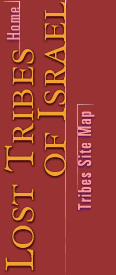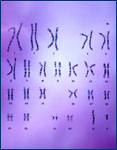
|

|
Back to Build a Family Tree All men and only men have a Y chromosome. This biological fact allows us to trace back in time a direct, largely unchanged genetic line of inheritance from father to son. Every person, male or female, has 22 matching pairs of chromosome—one inherited from each parent—but the 23rd pair is different. This unmatched pair, known as the X and Y sex chromosomes, determines whether we are male (XY) or female (XX). A mother always provides a single X chromosome in her egg. Inherit an X from your father and you will be a female, receive a copy of his Y you will be male. And so the Y chromosome travels from father to son with each successive generation of males. The second thing that makes the Y chromosome unique is that the information carried on Y chromosomes is inherited largely intact over time. Unlike other chromosomes, the genetic material on the Y chromosome is not mixed with each new generation. The reason is that when cells divide in preparation to make sperm and egg, all 23 chromosome pairs line up to exchange random bits and pieces of DNA with their matching partner before separating. All chromosomes do this exchange of genetic material save the mismatched XY pair. The Y is much shorter, and very little of its genetic information is broken up in an exchange of DNA with the X chromosome. The information carried on the Y chromosome travels from father to son as a nearly exact copy of itself. Occasionally, during the DNA copying process small changes or mutations occur, and it is these mutational differences that allow us to distinguish the Y chromosome of an individual from his ancestor's. Thus an actual genetic record of the male line going back through time exists—as clear a marker of paternal heritage as a father's family name. A tangible timekeeper of history, the Y chromosome allows us to trace human evolution, track migration patterns and relatedness in groups of people, and answer paternity questions going back generations. As we pull apart the Y chromosome, we begin to unravel some fascinating stories about our own origins. Continue: Tracing the Cohanim Back to Build a Family Tree Where are the Ten Lost Tribes? | Tudor Parfitt's Remarkable Journey Mystery of Great Zimbabwe | Build a Family Tree | Resources Teacher's Guide | Transcript | Site Map | Lost Tribes of Israel Home Editor's Picks | Previous Sites | Join Us/E-mail | TV/Web Schedule About NOVA | Teachers | Site Map | Shop | Jobs | Search | To print PBS Online | NOVA Online | WGBH © | Updated November 2000 |
